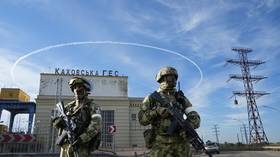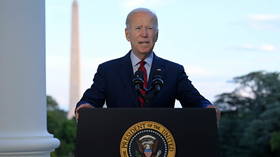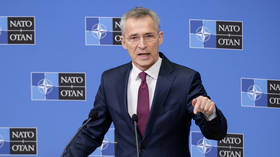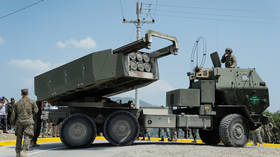A nuclear showdown? One of the greatest 'realist' fears about the Russia-Ukraine conflict is actually groundless, and here's why

Fears that the Ukraine conflict is now bogged down into some sort of stalemate which risks dangerous escalation from the parties involved in order to achieve victory are misplaced. There is only one victor in the Ukraine conflict, and that is Russia. Nothing can change this reality.
Renowned American intellectual John Mearsheimer has written an important article about the conflict, entitled: ‘Playing with Fire in Ukraine: The Underappreciated Risks of Catastrophic Escalation’. The article paints a dark picture about both the nature of the war in Ukraine (prolonged stalemate) and probable outcome (decisive escalation by the parties involved to stave off defeat).
Mearsheimer’s underpinning premises, however, are fundamentally flawed. Russia possesses the strategic initiative – militarily, politically, and economically – when it comes to the war in Ukraine and the larger proxy engagement with NATO. Moreover, neither the US nor NATO is in a position to escalate, decisively or otherwise, to thwart a Russian victory, and Russia has no need for any similar escalation on its part.
In short, the Ukraine conflict is over, and Russia has won. All that remains is a long and bloody mopping up.
The key to understanding how Mearsheimer got it so wrong is to dissect his understanding of the ambitions of both the US and Russia when it comes to the issue. According to Mearsheimer, “Since the war began, both Moscow and Washington have raised their ambitions significantly, and both are now deeply committed to winning the war and achieving formidable political aims.”
This passage is especially difficult to parse out. First and foremost, it is extremely difficult to articulate a sound baseline when it comes to assessing US “ambitions” vis-à-vis Ukraine and Russia. President Joe Biden's administration inherited a policy which had been conceived in the George W. Bush-era and partially implemented under the team of Barack Obama (where Biden played a critical role). This was a very aggressive policy geared toward undermining Russia with the goal of weakening the Russian president, Vladimir Putin, to such an extent that eventually he would be replaced by a figure more amenable to adhering to a US-dictated policy line.
But one cannot pretend that there were not four years of Trump administration policy which threw the anti-Putin – and, by extension, anti-Russia – narrative promulgated by the Obama administration on its head. While Trump was never able to gain traction for his ‘why can’t we be friends’ approach to US-Russian diplomacy, he was able to seriously undermine two major policy pillars which propped the Obama-era policy up, namely NATO unity and Ukrainian solidarity.
The Biden administration was never able to resuscitate the Obama-era policy direction regarding Russia, inclusive of its anti-Putin goals and objectives. Trump’s undermining of NATO's unity and purpose, when combined with the humiliating pull-out from Afghanistan, put the bloc on the back foot when it came to standing up to the challenge of a Russian state determined to be more assertive about what it viewed as its legitimate national security interests, inclusive of a new European security framework respectful of the notion of a Russian ‘sphere of influence’.
Instead, the world was treated to the spectacle of Joe Biden insulting his Russian counterpart with cartoonish ‘he’s a killer’ comments, all the while making promises regarding diplomatic initiatives (pressuring Ukraine to accept Minsk II, starting ‘meaningful’ arms control talks) that his administration proved unable and/or unwilling to follow through on.
When confronted with the reality of a Russian military build-up around Ukraine, the best the Biden administration could do was make empty military threats and even emptier promises about “meaningful and unprecedented” economic sanctions should Russia intervene militarily.
The fact is, while US government officials may make bold statements about the need to inflict harm, via proxy, on the Russian military through the provision of billions of dollars’ worth of weapons to Ukraine, it is the US which has had defeat inflicted on it in terms of the ongoing losses of its Ukrainian proxy military and the destruction of the equipment provided in support. The US, like its NATO allies, has proven to be very good at making bold pronouncements about goals and intent, but very bad at putting them into practice.
This is the state of American ‘ambitions’ vis-à-vis Ukraine today – all rhetoric, no meaningful action. Any fear of a US and/or NATO military intervention in Ukraine must be weighed against the reality that hot air does not generate cold steel; US politicians might be adept at filling the pages of a compliant mainstream media with impressive-sounding words, but neither the US military nor its NATO allies are able to generate the kind of meaningful military capability needed to effectively challenge Russia on the ground in Ukraine.
This reality severely limits the scope and scale of any possible US ambitions regarding Ukraine. At the end of the day, Washington has only one path forward – to continue to waste billions of dollars of taxpayers’ money sending military equipment to Ukraine, which has no chance of changing the outcome on the battlefield, to convince a domestic American audience that their government is ‘doing the right thing’ in a losing effort.
There is no ‘military option’ in Ukraine for either the US or NATO because, simply put, there is no military capable of meaningfully executing such an option.
This conclusion is critical to understanding Russia’s ‘ambitions’. Unlike the US, Russia has articulated clear and concise objectives regarding its decision to dispatch military forces into Ukraine. These can be described as follows: Permanent Ukrainian neutrality (i.e., no NATO membership), the de-Nazification of Ukraine (the permanent eradication of the odious nationalistic ideology of Stepan Bandera), and the de-militarization of the state – the destruction and elimination of all traces of NATO involvement in the security affairs of Ukraine.
These three objectives only reflect the immediate goals of the Special Military Operation in Ukraine. The ultimate objective – a restructured European security framework that has all NATO infrastructure withdrawn to the 1997 boundaries of that alliance – remains as a non-negotiable requirement that will have to be addressed after Russia secures its final military and political victory in Ukraine.
In short, Russia is winning on the ground in Ukraine, and there is nothing either the US or NATO can do to alter this outcome. And once Russia secures this victory, it will be in a far stronger position to insist that its concerns about a viable European security framework be respected and implemented.
Mearsheimer believes that the situation on the ground in Ukraine provides both the US and Russia with “powerful incentives to find ways to prevail and, more important, to avoid losing.”
At the end of the day, the Ukraine conflict is not an existential one for either the US or NATO; a loss in Ukraine will be another setback – Afghanistan on steroids. But a Ukrainian defeat does not, in and of itself, threaten NATO with collapse or spell the end of the American Republic.
Simply put, Mearsheimer’s fear that a loss in Ukraine “means that the United States might join the fighting either if it is desperate to win or to prevent Ukraine from losing” is unfounded.
So, too, is his contention that “Russia might use nuclear weapons if it is desperate to win or faces imminent defeat, which would be likely if US forces were drawn into the fighting.” Russia neither “faces defeat” nor has anything to worry about, existentially, from a US military intervention which, from all practical points of view, could not materialize even if the US wanted to be so bold.
Mearsheimer concludes his article by noting that “This perilous situation creates a powerful incentive to find a diplomatic solution to the war.”
Nothing could be further from the truth. Just as the US would be loath to seek a “diplomatic solution” to the conflicts waged against Nazi Germany and Imperial Japan, Russia would be similarly disinclined to engage in any diplomacy which denied it the full implementation of its core objectives.
Back in March, in response to a tweet from Joe Biden which declared “Let there be no doubt that this war has already been a strategic failure for Russia,” I responded by tweeting, “This war will go down in history as a strategic Russian victory. Russia will have halted NATO expansion, destroyed a dangerous den of Nazi ideology in Ukraine, redefined European security by undermining NATO, and demonstrated Russian military prowess, an important deterrent.”
Those words were accurate then, and they remain accurate today.
The statements, views and opinions expressed in this column are solely those of the author and do not necessarily represent those of RT.

















